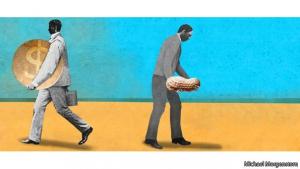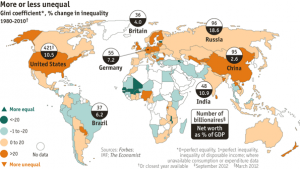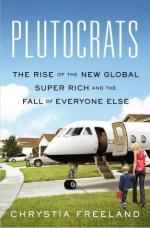

Inequality and the world economy
2012/10 The Economist
Many economists, too, now worry that widening income disparities may have damaging side-effects. In theory, inequality has an ambiguous relationship with prosperity. It can boost growth, because richer folk save and invest more and because people work harder in response to incentives. But big income gaps can also be inefficient, because they can bar talented poor people from access to education or feed resentment that results in growth-destroying populist policies.
The mainstream consensus has long been that a growing economy raises all boats, to much better effect than incentive-dulling redistribution. Robert Lucas, a Nobel prize-winner, epitomised the orthodoxy when he wrote in 2003 that "of the tendencies that are harmful to sound economics, the most seductive and...poisonous is to focus on questions of distribution."
But now the economics establishment has become concerned about who gets what. Research by economists at the IMF suggests that income inequality slows growth, causes financial crises and weakens demand. In a recent report the Asian Development Bank argued that if emerging Asia's income distribution had not worsened over the past 20 years, the region's rapid growth would have lifted an extra 240m people out of extreme poverty. More controversial studies purport to link widening income gaps with all manner of ills, from obesity to suicide.
The widening gaps within many countries are beginning to worry even the plutocrats. A survey for the World Economic Forum meeting at Davos pointed to inequality as the most pressing problem of the coming decade (alongside fiscal imbalances). In all sections of society, there is growing agreement that the world is becoming more unequal, and that today's disparities and their likely trajectory are dangerous.
http://www.economist.com/node/21564414
In the rich world the cronyism is better-hidden. One reason why Wall Street accounts for a disproportionate share of the wealthy is the implicit subsidy given to too-big-to-fail banks. From doctors to lawyers, many high-paying professions are full of unnecessary restrictive practices. And then there is the most unfair transfer of all—misdirected welfare spending. Social spending is often less about helping the poor than giving goodies to the relatively wealthy. In America the housing subsidy to the richest fifth (through mortgage-interest relief) is four times the amount spent on public housing for the poorest fifth.
Even the sort of inequality produced by meritocracy can hurt growth. If income gaps get wide enough, they can lead to less equality of opportunity, especially in education. Social mobility in America, contrary to conventional wisdom, is lower than in most European countries. The gap in test scores between rich and poor American children is roughly 30-40% wider than it was 25 years ago. And by some measures class mobility is even stickier in China than in America.
Some of those at the top of the pile will remain sceptical that inequality is a problem in itself. But even they have an interest in mitigating it, for if it continues to rise, momentum for change will build and may lead to a political outcome that serves nobody's interests. Communism may be past reviving, but there are plenty of other bad ideas out there.

















































PeoPo 討論區
回應文章建議規則: